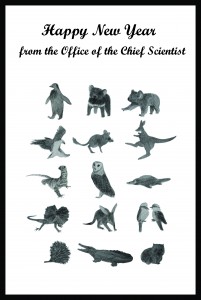|
|
|
|
|
|
Viewpoint-20 January 2010 |
|
|
This Viewpoint was first published on the website of Australia's Chief Scientist, Professor Penny Sackett on January 19, 2010.
Should you wish to leave a comment
for Professor Sackett you can do so
by clicking here and following
the prompts.
 The
recent break gave me the opportunity to begin planning for the sparkling New
Year ahead, while reflecting that, remarkably, one-fifth of my current term
Chief Scientist for Australia has already sped by.
The
recent break gave me the opportunity to begin planning for the sparkling New
Year ahead, while reflecting that, remarkably, one-fifth of my current term
Chief Scientist for Australia has already sped by.
In the last year, among other things, I’ve worked to institute a new
foresight process for the Prime Minister’s Science, Engineering and
Innovation Council to ensure that Australia is better prepared for the
future, made connections with overseas counterparts in the North America,
Asia, Europe and the Subcontinent, and stressed the importance of immediate,
meaningful and sustained action to reduce the emissions of greenhouse gases
that are responsible for climate change. As I said during my Keynote address
‘Moving the World’ in Melbourne at the end of 2009, because of our large
individual carbon footprints, as individuals, we Australians are probably
more able on a person-to-person basis to effect change than any other
individuals in the world.
What about this coming year? My 2010 to-do list as Chief
Scientist is as long as my arm (longer, actually, we tested this). But if I
could pick only a few to highlight, they might be these:
- Exploring how local communities,
including large cities, can be more proactive in limiting the amount of
climate change that will take place, while preparing to adapt to that which
cannot be avoided. If we do not alter our present trajectory, then even with
the best of intentions, the global average temperature may be 3 to 4 degrees
higher than it is today. What would that mean in your community? Have you
started to adapt? What do you think are the main contributors to the
collective carbon foot print of your local community? How can they be
reduced?
- Mathematics. Mathematics is the
language of the enabling sciences of biology, chemistry and physics, and in
this sense is the “Enabler of the Enabling.” It is the basis for the
transmission and secure encryption of information, upon which modern
commerce depends. Each of us can make wiser decisions at work, at home and
in the supermarket if we understand a bit of statistics and are good with
numbers. And yet, Australia lags far behind other economically developed
countries in its production of mathematically trained citizens, and the
situation is deteriorating. I don’t want to see this continue.
- Bringing young people into the
mainstream of scientific discourse. I’ve been proud to be part of the
National Youth Science Forum (NYSF) 2010, which this year is being held in
both Canberra and Perth. These hundreds of Australian year 11 leaders,
excelling in science and communication, are an inspiration to me, and I’d
like to help them connect with me, with one another, and with science.
That’s why I’ve decided to take the advice of the 2009 NYSF scholars and
become part of the social media revolution with the introduction of my facebook page.
There is plenty more in the works for the upcoming months
as 2010 is already shaping up to be a very busy year, so watch this space.
What do you think are the important scientific issues for 2010?
I’d like to become better connected to all of you,
regardless of where you are in the world, so I encourage you to look me up
on
facebook and to send me your feedback on this webpage. That way, I can
continue to respond the scientific issues that are most important to you.
Until next time,
Penny